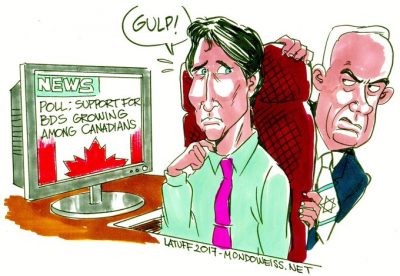The Trudeau Government Joins the Global Majority on Israel-Palestinian Relations
and B’nai Brith Canada is not happy about it at all

The Chief Executive of B’nai Brith Canada has condemned as anti-democratic a vote in late 2019 by Canada’s Trudeau government. In one of its first major international acts, Trudeau’s minority government sided with 166 other member states of the United Nations’ General Assembly. The Jewish organization expressed “outrage” at Canada’s position on a resolution dealing critically with the subject of Israel-Palestinian relations. “This vote reflects poorly on Canada’s record as a defender of democracy and justice. It stains Canada’s reputation,” said B’nai Brith’s CEO, Michael Mostyn.
Apparently Mr. Mostyn thinks nothing of invoking the principles of democracy and justice as justification for discounting as wrong and misguided the dramatic outcome of a free and fair vote by the world’s governments. In Mr. Mostyn’s view, all that is just and democratic adheres to the position of the five dissident governments that voted against the UN Resolution. The naysayers are Israel, the USA, Australia, Micronesia and Marshall Islands.
Mr. Mostyn and many other representatives of the Israel lobby have chastised the Trudeau government for taking a step that pulls Canada into the mainstream of global opinion especially when it comes to conditions in Gaza and the Occupied Territories. The Trudeau government has planted Canada’s flag among those of 167 national delegations. The governments of all these countries agreed to place an international spotlight on the many illegal acts that violate “the permanent sovereignty of the Palestinian people.”
In giving explicit reasons for its condemnation of the now-adopted UN Resolution, B’nai Brith Canada stated that it “rejects the contention that the [Jewish] settlements [in the Occupied Territories including East Jerusalem] are the core issue of the Israel-Palestine conflict.” The UN Resolution details many of the consequences for indigenous Palestinians of the influx of 700,000 Jewish settlers into territories illegally seized through armed conquest by the Israeli Armed Forces in 1967.
The Resolution also lists some of the public health abominations forced on “the Gaza strip during the military operations of July and August of 2014, which, inter alia, has polluted the environment and which negatively affects the functioning of sanitation systems and water supply.” There is reference to “unexploded ordinance” as well as a “chronic energy shortage” in Gaza where “only 5% of the ground water remains potable.”
The Resolution makes specific reference to “the detrimental impact on Palestinian natural resources being caused by the unlawful construction of the wall by Israel, the Occupying power, in the Occupied Palestinian Territory, including in and around East Jerusalem, and in its grave affect as well on the economic and social conditions of the Palestinian people.”
B’nai Brith’s criticism of the Trudeau government ignores most of the explicit content outlined in the now-adopted UN Resolution. Instead of facing the facts, B’nai Brith radically misrepresents as “anti-terror measures” the broad set of changes the Israel government has imposed on the lands at issue.
The Resolution clearly identifies the actions of a government whose goal it is to favor one group by dispossessing and disempowering another. The situation on the ground in the area occupied and controlled by the Israeli government makes it absolutely clear that the real goal is to replace the indigenous Palestinian population. The international emblem of Israel’s replacement project has become the 131 illegal Jewish settlements plus the 110 illegal outposts created to prevent Palestinians from enjoying any security of habitation.
B’nai Brith Canada sometimes represents itself as a “human rights” organization engaged in benevolent philanthropy. It has exploited this image to gain federal recognition as a registered charity capable of granting tax deductions for donations. Perhaps the time has come for an objective federal assessment to see if B’nai Brith Canada has lived up to its side of the bargain. Has B’nai Brith Canada acted like a genuine charity devoted to the ideal of universal human rights or has it acted more as a partisan political lobby?
B’nai Brith Canada announced in its press release that it “remains opposed to Palestinian attempts to internationalize the issue.” How ironic. As I see it, the track record of B’nai Brith Canada is one part of a much larger body of evidence demonstrating the scale of an elaborate Israel lobby based in many countries? Doesn’t the multinational reach of this very active political lobby effectively internationalize the core issues of Israel-Palestinian relations on a 24/7 basis?
The instability of relations between Israel and the Palestinians has significant implications for the domestic and international polices of many countries. For instance, how will the Trudeau government and the Trump government deal with the contentions that have put them on different sides of the recent UN vote? Will the Trudeau government continue to move away from the legacy of Harper government when it comes to correcting the gross inequities permeating almost every aspect of Israel-Palestinian relations?
*
Note to readers: please click the share buttons above or below. Forward this article to your email lists. Crosspost on your blog site, internet forums. etc.
Anthony James Hall has been Editor In Chief of the American Herald Tribune since its inception. Between 1990 and 2018 Dr. Hall was Professor of Globalization Studies and Liberal Education at the University of Lethbridge where he is now Professor Emeritus. The focus of Dr. Hall’s teaching, research, and community service came to highlight the conditions of the colonization of Indigenous peoples in imperial globalization since 1492.
Featured image is from AHT

